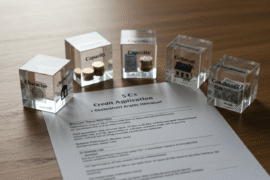This article may contain references to products or services from one or more of our advertisers or partners. We may receive compensation when you click on links to those products or services. Nonetheless, our opinions are our own.
The information presented in this article is accurate to the best of our knowledge at the time of publication. However, information is subject to change, and no guarantees are made about the continued accuracy or completeness of this content after its publication date.
If you’ve been struggling to collect payments from your clients, your collection system must not be working. You’ll probably need to device a new one. That’s because if unpaid debts continue to pile up, your business cash flow will be compromised. And that could result in ugly financial losses.
As you already know, your company’s cash flow is what drives it forward. It allows you to settle your payments to other contractors, pay for the company’s expenses like electricity, manpower, and production. Once your cash flow plunges into negative, it only means that your business assets are decreasing.
Doesn’t sound good, right? Insufficient cash flow will certainly hurt your company especially if the reasons for its impediment are preventable problems like uncollected debts.
But there’s always a silver lining to everything. It’s not exactly the end of your career once uncollected payments start to hurt your company’s pocket. In this piece we’ll talk about how you can effectively regain control over these debts of your clients and ultimately save the future of your business.
A little heads up, though. These techniques are not meant to be easy. These involve a lot of legwork, meetings and phone calls. But trust us, these will be all worth it once you see the result.
1. Find out why your clients can’t pay up
One of the major reasons why other companies fail to stick to their financial obligations is because of unexpected money problems. These are only natural for businesses and can happen to anyone. Once your clients experience these issues, they will definitely have a hard time paying you.
While it’s only right to collect payments from them because it’s their contractual obligation, you might want to step back a bit and handle this situation better.
It’s important to note that during these unfortunate events, it will be helpful for both parties if you know the root of the problem or the financial struggles of your client. Showing them that you are concerned not only of their debts but also their status is the best way to do it. This way, they’ll cooperate with you more easily.
Discussion is also key to solving this dilemma. It’s important to talk about what each party can and cannot do at the moment concerning the situation at hand. From there, you could meet halfway.
If this situation isn’t handled properly, this could be your first time seeing a client walking out of the door. Trust us, you don’t want to lose both the money and the client in the process. That’s why it’s best if the solution will come from both ends.
2. Provide payment options to your client
This may irk some companies out there, but alternative payment plans could be the only way out for both parties.
You can present them two or more flexible payment terms and let them choose which one will work best for them. Just make that these terms you just whipped up will also favor your company.
Repeat the terms to your client twice just to make sure they clearly understand the agreement. Then put it on paper and have your client sign on the contract to legitimize everything.
This kind of strategy will certainly yield slower return of the money, but at least your cash flow will be consistent.
With this alternative, you are getting paid to prevent the impediment of your cash flow. But at the same time, you get to keep your client. This technique could be beneficial to your company in the future. Especially once your client gets back on its feet. It’s definitely a win-win situation for both parties.
Just never get tired to follow up and follow up to make sure the contract is obeyed.
3. This time, put collaterals in the contract
Keep in mind that sympathizing with your clients is necessary but holding them accountable at certain times is also essential.
To make sure that the new agreement will be followed by your client, bring collaterals into the picture this time. These collaterals will be your safety nets just in case your client doesn’t comply with their contractual obligations again.
Agree on the items which will be considered as collaterals. These could range from bonds and stocks to cars and properties. Anything that can be easily converted to cash to repay the debt must be included as a collateral.
Make sure that these items have almost the same value as the amount of debt. Also, don’t forget to indicate these clearly on the written contract so both parties have something to hold on to in the future.
4. Assess every account on your plate
After solving one problematic account, next thing you should do is to revisit other existing projects. Then assess which accounts are problematic and what projects are smooth-sailing.
Weeding out the bad clients from the good ones will help you get the big picture of what’s the current financial status of your company. Distinguishing which client pays up and who does not will also help you assess whether your cash flow is sufficient to pay your employees, spend on production expenses, or basically run the whole company.
Once you’ve assessed them all, now you can focus all your energy and every last bit of your patience in recovering debts from those bad accounts.
Apply the same techniques mentioned above and go recover some debts!
5. Seek help from the experts
Admit it, you can’t do it all on your own. Dealing with problematic clients is just too much, especially if you already got your hands full with a lot of meetings for new projects. Sometimes, letting others solve the problem for you is the best route.
You’ll also need someone who will do all the legwork for you. They will write the contracts (based on your approval), they will be the ones to make follow-up phone calls, and everything else which needs to be done.
More often than not, business owners are ambivalent in getting help since they’re worried of the costs that come with it. But there is nothing to worry about because the fees will surely outweigh all the stress and hassle you have to go through if you do the collection yourself. To ease your mind on how much debt collectors charge, here’s an informative article that will give you some idea.
If you’re already convinced of the advantages of hiring debt collection agencies, the next thing to do is to actually scour the city for the best one. Here are some tips on how to find the best collection agency that will meet your needs:
- Look for their accreditations. Here in Australia, you would want to partner with agencies which are accredited by the Institute of Mercantile Agents, the Australian Institute of Credit Management and ACA International.
Keep in mind that the agencies that you’ll partner with will have a direct impact on your reputation because they’ll be the one to talk to your customers and clients.
- Reasonable fees. One of the reasons why you’re hiring a third party is because you also want to save money. That’s why hiring someone with sky-high fees doesn’t make sense.
But we’re not advising you to go for the cheaper ones. Keep in mind that lower rates don’t always translate to best results. Sometimes opting for the cheaper agency could also mean choosing the least skilled collector. Always refer to return rates if possible.
There are collection agencies out there that offer “No collection, no commission” kind of service. They only charge when they are able to collect debts. In addition, most agencies also have tiered pricing structures which can be beneficial to your company. So you might want to take advantage of that.
- Success rates. It can be hard to establish which agency is good at collecting because success rates vary greatly. Look for agencies that can give you comprehensive reports that include recovery rate, time it took to recover debts, comparison reports and others.
- Knowledge in your industry. The agency that you should hire must be well-versed in your business. For example, if you’re in the animal care industry, the debt collection company you should tap must have experience in the same industry, or at least know the jargons, requirements, rules and regulations, and other governing laws in that industry.
Debt collection agencies are certainly the kind of expert assistance which you’ll need when dealing with problematic clients. You’ll need help in developing strategies to recover debts from clients that will improve your company’s cash flow. And you would want to partner with agencies who, literally, have been there and successfully done that.
So if you think you’ve ran out of options and solutions in collecting payments, this might be the best time to step back a bit and let the experts step in. This way, you can solve your financial problems while you’re out there spending your time and resources to expand your network and grow your business.

Reviewed and edited by Albert Fang.
See a typo or want to suggest an edit/revision to the content? Use the contact us form to provide feedback.
At FangWallet, we value editorial integrity and open collaboration in curating quality content for readers to enjoy. Much appreciated for the assist.
Did you like our article and find it insightful? We encourage sharing the article link with family and friends to benefit as well - better yet, sharing on social media. Thank you for the support! 🍉
Article Title: 5 Effective Debt Recovery Techniques You Should Try
https://fangwallet.com/2021/02/22/5-effective-debt-recovery-techniques-you-should-try/The FangWallet Promise
FangWallet is an editorially independent resource - founded on breaking down challenging financial concepts for anyone to understand since 2014. While we adhere to editorial integrity, note that this post may contain references to products from our partners.
The FangWallet promise is always to have your best interest in mind and be transparent and honest about the financial picture.
Become an Insider

Subscribe to get a free daily budget planner printable to help get your money on track!
Make passive money the right way. No spam.
Editorial Disclaimer: The editorial content on this page is not provided by any of the companies mentioned. The opinions expressed here are the author's alone.
The content of this website is for informational purposes only and does not represent investment advice, or an offer or solicitation to buy or sell any security, investment, or product. Investors are encouraged to do their own due diligence, and, if necessary, consult professional advising before making any investment decisions. Investing involves a high degree of risk, and financial losses may occur including the potential loss of principal.
Source Citation References:
+ Inspo












































